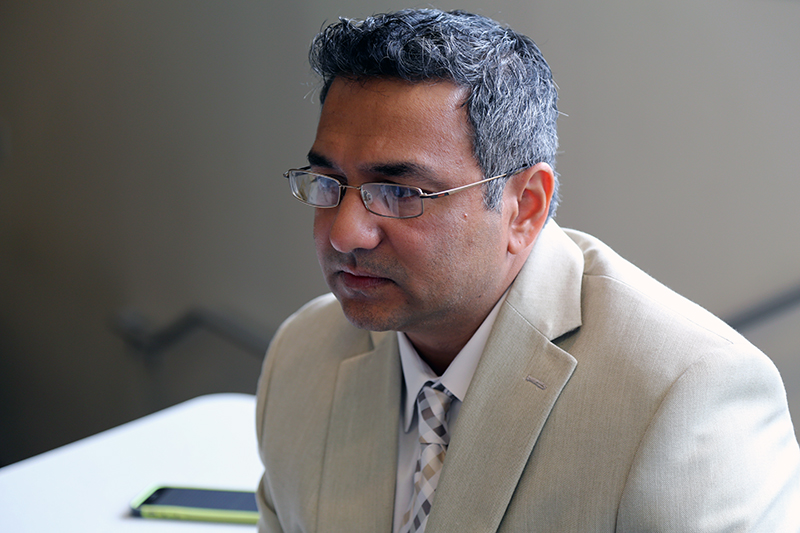 On January 31, associate professor Raj Sampath was invited to join Al Jazeera America's Sunday evening news to provide analysis for the February 2 Indian Supreme Court hearing on Section 377 of the Indian Penal Code, an old British colonial law that criminalizes consensual, private acts of LGBTQ people and which was carried over into the Indian constitution after independence in 1947. After nearly 60 years of the law going unchallenged, the High Court of New Delhi ruled the law unconstitutional, effectively decriminalizing gay sex. That ruling was subsequently challenged by several conservative religious groups, and eventually in 2013 the Indian Supreme Court overturned the Delhi Court, thereby recriminalizing homosexuality.
On January 31, associate professor Raj Sampath was invited to join Al Jazeera America's Sunday evening news to provide analysis for the February 2 Indian Supreme Court hearing on Section 377 of the Indian Penal Code, an old British colonial law that criminalizes consensual, private acts of LGBTQ people and which was carried over into the Indian constitution after independence in 1947. After nearly 60 years of the law going unchallenged, the High Court of New Delhi ruled the law unconstitutional, effectively decriminalizing gay sex. That ruling was subsequently challenged by several conservative religious groups, and eventually in 2013 the Indian Supreme Court overturned the Delhi Court, thereby recriminalizing homosexuality.
Sampath spoke of how the 2013 Supreme Court decision was based on several key factors that maintained the constitutionality of Section 377 that criminalizes homosexuality. One was the “presumption of constitutionality,” in which any laws created under British colonial rule that carried over to the Indian constitution after independence enshrine legislative approval, and only the legislature today should consider removal of laws rather than the judiciary. Furthermore, they argued that the law does not discriminate against a class of individuals per se, but isolates the act of sodomy for which heterosexuals could be criminalized as well. Evidence pointed to the lack of any recent prosecutions of LGBTQ peoples violating the law and so the issue of its efficacy came up when it comes to real cases that violate liberty and equality before the law. Lastly, in the previous year the Supreme Court legalized transgender as a third gender category pointing to the resources of Hinduism as a religious culture and long-standing civilization that promotes tolerance, respect and plurality of identities in contrast to the Judeo-Christian foundation of Western law, which operates under binary terms. For example, although the U.S. legalized gay marriage last year, there still are no legal protections for transgender people to be free from employment discrimination or use of public facilities that allow for separate restrooms.
 Human Rights advocacy groups and international pressures to respect LGBTQ rights and enforce duties to protect them mocked the 2013 Supreme Court ruling as succumbing to conservative religious pressures, when in fact some argue that police brutality towards LGBTQ peoples is a reality. Furthermore the old British colonial law violates our sense of the privacy, dignity and autonomy of individuals to make decisions of their utmost interest, such as sexual orientation and practice, without interference from the state. For example the Due Process clause and the Equal Protection clause of the 14th Amendment in the U.S. Constitution were leveraged to overturn the last state anti-sodomy laws, such as Lawrence v.Texas (2003). LGBTQ human rights advocates in India argue that Section 377 violates articles 14 on equality before the law, 15 on discrimination, and 21 on liberty, privacy, autonomy and dignity. Furthermore, unlike the arguments put forth by many conservative religious groups that “homosexuality is due to a mental disorder,” the counter-argument is that discrimination, repression and marginalization of LGBTQ peoples increases mental health issues, which can be scientifically documented, and prevents health workers, NGOS and advocacy groups to work on HIV issues, particularly in gay communities. In short, the old British colonial law continues to hide behind its enduring constitutionality while increasing intolerance, ignorance and social stigmatization of LGBTQ peoples.
Human Rights advocacy groups and international pressures to respect LGBTQ rights and enforce duties to protect them mocked the 2013 Supreme Court ruling as succumbing to conservative religious pressures, when in fact some argue that police brutality towards LGBTQ peoples is a reality. Furthermore the old British colonial law violates our sense of the privacy, dignity and autonomy of individuals to make decisions of their utmost interest, such as sexual orientation and practice, without interference from the state. For example the Due Process clause and the Equal Protection clause of the 14th Amendment in the U.S. Constitution were leveraged to overturn the last state anti-sodomy laws, such as Lawrence v.Texas (2003). LGBTQ human rights advocates in India argue that Section 377 violates articles 14 on equality before the law, 15 on discrimination, and 21 on liberty, privacy, autonomy and dignity. Furthermore, unlike the arguments put forth by many conservative religious groups that “homosexuality is due to a mental disorder,” the counter-argument is that discrimination, repression and marginalization of LGBTQ peoples increases mental health issues, which can be scientifically documented, and prevents health workers, NGOS and advocacy groups to work on HIV issues, particularly in gay communities. In short, the old British colonial law continues to hide behind its enduring constitutionality while increasing intolerance, ignorance and social stigmatization of LGBTQ peoples.
In response to a curative petition that allows aggrieved parties to receive relief from a Supreme Court ruling that has a negative impact on the party or from which gross miscarriages of justice may ensue, on February 2, 2016 three judges of the Indian Supreme Court decided to send the issue of Section 377 to a five-judge bench for in-depth hearings to revisit the constitutionality of the law. This has given hope to LGBTQ peoples in India and globally that perhaps in the near future the old British law will be abolished and the full dignity, privacy, autonomy, liberty and equality of LGBTQ peoples will be guaranteed. Being deemed a criminal on the basis of one’s sexual orientation is anathema to increasing international human rights laws in the early twenty first century, and perhaps this is what moved the Court to reconsider its stance on the issue.
